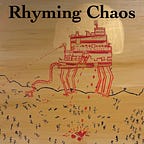
The daily onslaught of outrageous news of corruption, destruction of government capacity, and attacks on science and education in the U.S. right now is dizzying. “What now?” you scream as you scroll through the morning’s news. It’s a little like the world Geremie R. Barmé stepped into in 1974, when he arrived in China as an exchange student from Australia. The late Cultural Revolution was a “constant bombardment of noise and information” that likewise made one dizzy before breakfast.
Geremie is a Sinologist, historian, filmmaker, translator, and author of a number of books on Chinese culture and politics. You can read a recent interview with him on his work here, and find his most recent writings at China Heritage. He was the guest on the first episode of Rhyming Chaos, released on February 20, 2025: How to commit a self-coup, in the U.S. and in China.
In this follow-up podcast, recorded on September 30, the same day Donald Trump told a gathering of senior leaders of the U.S. armed forces that they must target “the enemy within,” we discussed:
The relentless daily “bombardment of noise and information” in 1970s China.
The “Hall of One Voice” 一言堂: Deng Xiaoping’s term for when only Mao’s voice mattered, and the sycophants around him ensured he heard nothing that might upset him.
Snitching in the Cultural Revolution, JD Vance, and Laura Loomer.
The surveillance state in China and the U.S., and Larry Ellison’s vision.
Big character posters 大字报 and Twitter.
Attacks on expertise, science, and learning under Mao and Trump.
The progress of Project 2025; Russell Vought and Stephen Miller’s radical plans to reshape America.
Perpetual anger: Why Trumpists remain furious and the maintenance of grievance culture in China.
The Mao-era disconnect between rhetoric and reality; current American conspiracy theories and inability to distinguish fact from fiction.
Lin Biao’s militarization of China (1968-1971), and increasing military control of American society.
The Rhyming Chaos podcast is produced by Jeremy Goldkorn and Maria Repnikova, and edited by Cadre Scripts. The theme music is Paper Boy, composed and performed on the guzheng by Wu Fei. Our closing music is Erik Satie’s Gymnopédie No. 1, arranged and performed by Wu Fei. Our cover art is by Li Yunfei.
Please subscribe wherever you get your podcasts, leave us a review, and if you like what we’re doing, please take out a paid subscription at rhymingchaos.com.











